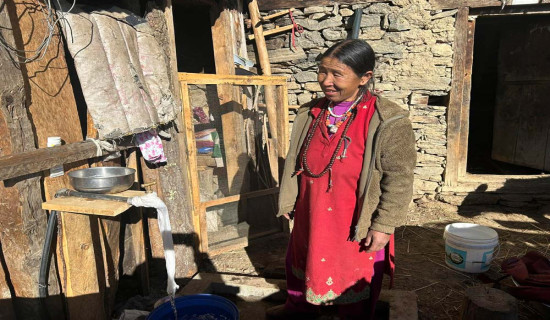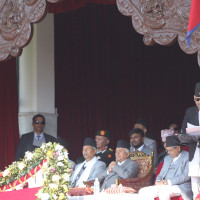- Monday, 15 December 2025
Zahira: A Story Of An Unfulfilled Love Wish
Authors often sensibly choose titles for their books using the names of their main characters. This practice effectively stitches these characters into the collective spirit and imaginations of society. Laxmi Prasad Devkota's "Muna-Madan" stands as a masterpiece example in Nepali literature. Here we also have a freshly published book that bears the name of the principal character for the title. Madhav Kafle is the author of the novel titled "Zahira." In fact, this novel, which carries a single-word title, is meaningful because it highlights the central theme of the love story of the principal character, Zahira. However, Zahira, as we know, is not a Hindu girl’s name. Yet the story the novelist has shown is that she becomes the true love of a Hindu Nepali man. The novelist demonstrates that the deep and unstoppable power of love causes this phenomenon.
Let us also talk a little about the author. The novelist Madhav Kafle lives in Rautahat District and is contributing to different beats of Nepali literature. And to remember, the essay is his much-loved genre of expression.
However, this time he has forayed into writing a novel under the title "Zahira." What prompted the author to write a story with Muslim themes that was also from Calcutta, India? It may be a question for him. But reasons to guess, too, are there.
In fact, his home place, Rautahat, is also one of the few districts in Nepal where a huge number of Muslim people live, and the city of Calcutta, being a huge city, has been a labour market. Thus, it is natural for the author to choose a Muslim background to write a novel in this city.
Yet the topmost reason for this novel has been the theme of love itself. In fact, love has always been unstoppable in human lives. The cases of inter-cast love and marriage, too, have been increasing for this reason.
In addition to the principal character Zahira, the novel has woven stories with descriptions of the sentiments and behaviours of characters Dibesh, Ekbal, Nadim, Jasmin, Amma Jarina, Punam Sahu, and Dip Bahadur. The main theme of love has expanded with this feature.
The novelist has described some of the known places in Calcutta, India, like Hugli Riverbank, Victoria Memorial, Khidirpur, Sonagachhi, Metro Cinema Hall, etc. Besides public places, he has also mentioned Mussaira-Kabbali traditions of the Muslim community, their way of greetings, their Nikah marriage rituals, etc. This all shows that author Kafle is keen to know about the social practices of Muslim communities for his writing, and the present novel Zahira is his new proof of his passion for literary pursuits.
The novelist has centred the main theme of love between a Muslim girl and a Hindu-Brahmin boy on this background. In fact, this is a kind of silent love. But silent love in the novel sometimes becomes vocal, too. That is why two lovers guess and feel the need to talk about their love for marriage.
This guess is not confined to them only; it is little known to Zahira’s guardians’, too. But getting nods for girls and boys from guardians is very hard because of two opposite religions and cultures. Some curiosities develop, and one day even Zahira’s family prepares to accept the situation if the boy and girl decide to marry.
Meanwhile, Dibesh comes to Nepal, and his return to Calcutta is delayed because of festivals. During this stay, he musters his courage to disclose his love for a Muslim girl, even to invite the family wrath. But fear overcomes courage, and he can’t speak even a word about it in the family in Nepal. Finally, he goes to Calcutta, making his courage strong enough to marry Zahira.
But have time and tide awaited anyone? Zahira’s family arranges her marriage, and he has no other alternative but to accept it. The novel’s whole story is about the love of a Muslim girl and a Hindu boy, but sadly, it comes to an end after the marriage of Zahira to a man of her own community.
The beauty of this novel lies in the simplicity of the description. Furthermore, bringing traditions and cultures into writing for stories from religiously different communities is also a merit of this novel. In fact, human stories may not be homogeneous, and there are also many instances where man happens to move towards an undesirable situation. And the merit of literature is that it deals with all situations. Madhav Kafle’s theme of the novel is in line with this literary pursuit. The author, thus, deserves kudos.
(Kafle is a former Deputy Executive Editor of this daily)

















